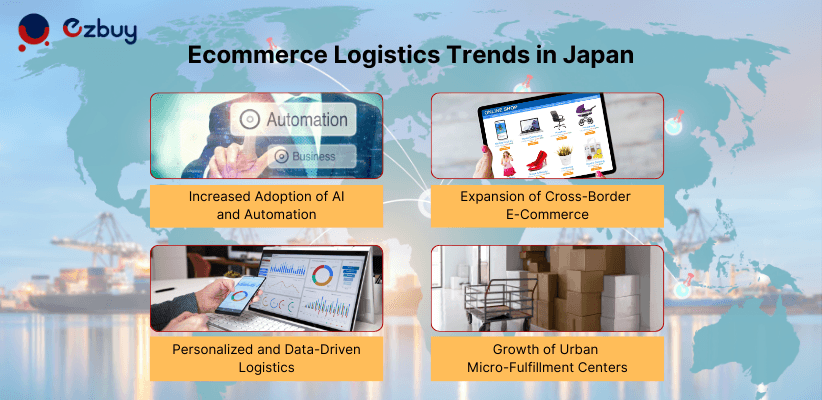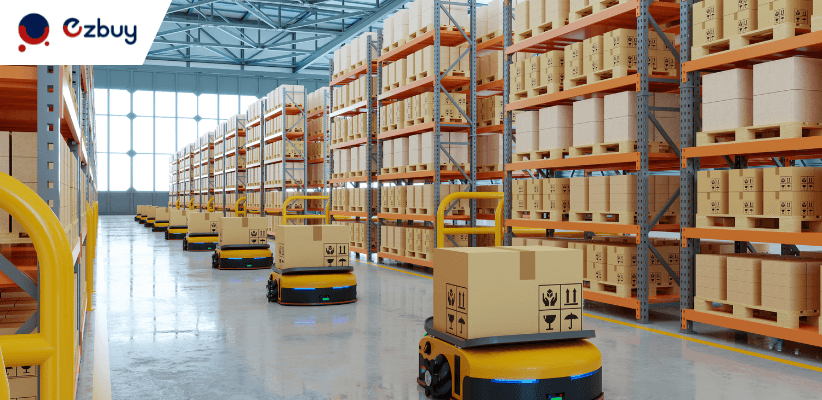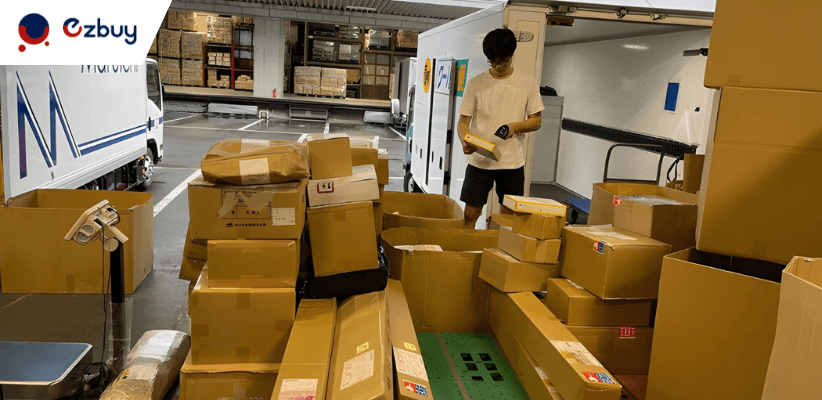Ecommerce Logistics in Japan - Navigating Fulfillment and Cross-Border Shipping Solutions
By Macy -01/04/2025 UTC.
Japan boasts the fourth-largest e-business market in the world, with revenues of approximately $174 billion in 2023 (eMarketer). Its high penetration of the internet, tech-friendly consumers, and well-developed logistics network have all supported the accelerating growth of e-business.
Yet, keeping up with the growing demand for quick and effective deliveries is still a challenge. Ecommerce logistics in Japan is responsible for providing seamless fulfillment, last-mile and cross-border delivery to local and overseas companies.
1. Overview of Ecommerce and Logistics in Japan
According to GlobalData, Japan's online shopping is growing robustly on the heels of consumers' online purchasing behavior and mobile penetration. It is projected to grow 7.7% to around $206.8 billion (JPY29 trillion) in 2025. The market grew 8.4% to $191.9 billion (JPY26.9 trillion) in 2024.
The domestic platforms of Japan include Rakuten, Amazon Japan, and Yahoo! Shopping, which dominate the country's e-commerce. With over 125 million population and highly-developed online payment networks, e-commerce is highly integrated in the lifestyle of its citizens.
Ecommerce logistics in Japan had a size of $337 billion in 2024 and is expected to grow to $549 billion by 2033, growing at a CAGR of 5.6% between 2025-2033. Japan has one of the globe's strongest logistic infrastructures, and the major companies here include Yamato Transport, Sagawa Express, and Japan Post. The fierce demand on the part of consumers to get next-day or same-day delivery forces logistic companies to innovate and upgrade their services continuously.
2. Challenges in Ecommerce Logistics in Japan
2.1. High Customer Expectations
Japanese customers tend to insist on reliability, speed, and accuracy. They insist on on-time delivery with proactive tracking and active customer care. Delayed or mislaid shipping is capable of damaging the reputation of a retailer severely. This demand keeps logistic providers under tremendous pressure to deliver at a very high level.
2.2. Urban Congestion and Limited Space
Large cities in Japan, such as Tokyo and Osaka, are densely populated and have local fulfillment challenges. With cramped roads, few parking spots, and heavy traffic, it is not easy for delivery trucks to drive and deliver efficiently. Excessive property values within the city center also render large-scale fulfillment centers less viable, and operators have to make the best of the placement of warehouses and apply micro-fulfillment strategies.
2.3. Workforce Shortages and Rising Labor Costs
Japan's shrinking workforce caused by its increasing elderly population is the reason it is experiencing labor shortages in warehousing and logistics. With fewer hands to pack, sort, and deliver, business companies are considering automation, robots, and AI with increasing regularity. However, investing in automatic mechanisms is a capital-rich operation involving massive initial investment, which is not within the reach of small companies.
2.4. Cross-Border Shipping Complexity
For overseas vendors, it is difficult to cope with Japan's strict customs regulations, import tariffs, and lingos. They have to comply with local legislation, and documentation errors might delay shipping or reject it. Foreign companies should also simplify direct-to-customer shipping to meet the high level of customers’ demand and reduce ecommerce shipping costs in Japan.
2.5. High Cost of Logistics Infrastructure
Japan's highly-developed infrastructure is costly, with upscale rental of warehouses, high-tech investment in technology, and costly fuel and labor. All of these costs are ultimately transferred to e-commerce firms, which forces them to rationalize fulfillment processes and bargain better terms with logistic providers in an effort to remain competitive.
3. Key Ecommerce Logistics Solutions in Japan
3.1. Third-Party Logistics (3PL) Providers
Many online retail companies in Japan rely on 3PL vendors for storage, order fulfillment, and shipping services. By outsourcing logistics to third-party providers, sellers can focus on growing their business without worrying about processing the orders efficiently and rapidly. The best 3PL vendors provide comprehensive services such as stock control, inventory storage, picking and packing of goods, and shipping services to the customer’s location.
3.2. Automated Warehouses and Smart Fulfillment Centers
Automation solutions like AI or robotics are now commonplace in Japan. In order to deal with increasing operational costs and labor shortages, many fulfillment service providers have adopted sophisticated AI-driven and robotics-powered fulfillment centers.
These advanced warehouses have automated systems for sorting products, robotic hands that pick and pack products, and AI that predicts demand for products and stock items accordingly. This helps improve inventory control and order processing accuracy and efficiency. Automated sorting minimizes human error; moreover, robotic systems enhance warehouses’ ability to fulfill orders with minimal human involvement in the retrieval and packaging of products.
3.3. Advanced Last-Mile Delivery Networks
Japanese customers expect fast and reliable services and therefore last-mile delivery is crucial. To solve the missed deliveries problem, businesses have adopted smart lockers for ease of access as well as convenience store pick-ups whereby customers can pick up their parcels from convenience store locations such as 7-Eleven and Lawson. This is especially useful for people with busy lifestyles as it enhances flexibility and convenience.
Japan is also adopting sustainability in the last-mile delivery processes. In urban areas, eco-friendly shipping fleets such as bicycles and electric scooters are being adopted by Yamato Transport and Japan Post. In addition, AI-powered route optimization is aiding couriers in cutting down fuel usage, avoiding traffic, and making faster efficient deliveries. This improves the e-commerce logistics system as a whole.
3.4. Cross-Border Logistics Support
International merchants wanting to expand to Japan for their e-commerce business face hurdles such as customs regulations, compliances for imports, and last-mile delivery issues. Logistics providers like Ezbuy Japan facilitate this process by providing easy cross-border services that ensure that shipments are within the limits of Japan’s strict import law.
3.5. Omnichannel Logistics and Same-Day Delivery
Omni-channel retailing has introduced the need for integrating in-store pickup, micro-fulfillment centers, and even same-day deliveries. Retailers are using various fulfillment methods to ensure proper buying experiences for customers both on and offline.
One of the approaches is called BOPIS, which stands for Buy Online Pick-up In Store. Large retailers like Uniqlo and Muji allow shoppers to buy products through their websites and then “pick” them up at their nearby stores. This method saves money on shipping while getting customers into the brick-and-mortar stores which need more foot traffic.
Furthermore, micro-fulfillment centers in urban areas that serve only online orders have been becoming a trend as they enable faster deliveries and reduce reliance on large, centralized distribution centers.
To accommodate the increasing demand for fast shipping, businesses are forming same-day delivery agreements with local shipping companies. This method enables sellers to give quick pleasure, enhance consumer loyalty, and improve the overall buying experience.
>>> Read more: Why your business needs a product fulfillment center in Japan?
4. Ecommerce Logistics Trends in Japan 2025
Foremost, it is apparent that the evolution of ecommerce logistics in Japan will be dictated by novel technology, sustainability initiatives, and changing patterns of consumption.

4.1. Increased Adoption of AI and Automation
2025 will further require strategies to incorporate automation and robotics as Japan has already started implementing these technologies. AI will be instrumental in demand estimation, which will expand to include, bidding automation, account management, delivery management, and warehouse operations.
Demand estimation logistics is set to benefit from AI technologies as implementation increases. AI does not only analyze the history of orders, but also identifiable potential seasonal changes, and consumer behavior for inventory and warehouse stock from several sources. The persistent lack of workers available means robotic technology will be necessary for sorting, period, packing, sorts, and rely whilst also ensuring quicker responsive periods.
4.2. Expansion of Cross-Border E-Commerce
Japan is gradually warming up to the idea of purchasing foreign brands and other specialty goods that are not easily available in the country, which is contributing to the rapid growth of e-commerce imports into Japan. This increased demand is also accelerating the development of cross-border logistics solutions for ecommerce in Japan which enables foreign companies to tap into the booming e-commerce market in Japan.
Logistics companies are automating the clearance of customs and the calculation of taxes by area, which allows local sellers to easily comply with the global seller's regulatory requirements, making it possible to seamlessly cross borders.
4.3. Personalized and Data-Driven Logistics
Japan's logistics business is becoming more data-driven and customer-centric, with AI-based platforms making inventory management, delivery precision, and customer experience smoother. With visibility into consumption trends and demand, logistics firms can maximize efficiency and offer tailored solutions.
Predictive logistics will make demand forecasting possible, ending stockouts and overstock issues. Dynamic shipping pricing will become the order of the day, with reduced prices in off-peak hours and express services for fast deliveries.
Moreover, hyper-personalized parcel drop will allow customers greater control, such as time-slot choice, differing pick-up points, and flexible re-booking. As ecommerce logistics in Japan improve, these developments will provide a new benchmark for smooth and efficient delivery in Japan.
4.4. Growth of Urban Micro-Fulfillment Centers
To meet the rising demand for next-day and same-day shipping, Japanese logistics companies are integrating micro-fulfillment centers (MFCs) - city center-based high-tech centers to enable expedited order delivery and last-mile transportation.
Among other trends, the utilization of dark stores - the permanent order-fulfillment facilities without stocks - is increasing use to enable in-a-few-hours delivery to match retailers' aspirations. For businesses like food retailing, apparel fashion, and electrical/electronics categories, expediting goods shipping enhances buyer satisfaction.
To achieve maximum efficiency, fulfillment centers for online stores in Japan use AI-driven inventory management, stocking strategically in line with demand patterns. This reduces shipping time, costs, and warehouse inefficiencies, rendering Japan's e-commerce logistics infrastructure strong.
5. How Ecommerce Logistics Works in Japan
5.1. Order Processing and Fulfillment
Japanese ecommerce fulfillment services do their job really well at picking up the order instantly. The system verifies the availability of the stock and forwards the order to the local warehouse to reduce shipping time.
Most of the warehouses use robotic picking and automatic packaging to speed up fulfillment and prevent mistakes. Orders are marked, sorted, and shipped to the appropriate shipping channels for fast and safe delivery after they are packed, ensuring Japan's high profile for effective e-commerce fulfillment.
5.2. Last-Mile Delivery Networks
The infrastructure of last-mile delivery for ecommerce in Japan ensures fast, reliable delivery, with same-day or next-day delivery in most cities. Door-to-door delivery by major couriers like Yamato Transport, Sagawa Express, and Japan Post continues to be the norm because it is efficient and accurate.
For extra convenience, services allowing for pickup of parcels at 24-hour convenience chains like 7-Eleven and Lawson have been born. Smart lockers and parcel lockers also make secure, self-service pickup possible. These accessible options make Japanese e-commerce logistics among the world's most advanced.
5.3. Real-Time Tracking & Customer Communication
Japan's ecommerce order processing is convenient and transparent with proactive notifications and real-time tracking. Customers can track deliveries via tracking links, mobile apps, or SMS, updating them on their order status constantly.
To avoid missed deliveries, couriers also offer time-slot selection and rescheduling, allowing customers to modify shipping times as per their requirements. Route optimization using AI also increases efficiency by helping drivers evade delays. All these technologies make Japan's fulfillment system fast, reliable, and customer-centric.
5.4. Reverse Logistics & Returns Management
Ecommerce logistics in Japan provide a hassle-free returns experience in order to ensure customer loyalty. The customers can return goods at 24-hour convenience stores or post offices without any complex paperwork.
Some locations make automated refunds, paying as soon as the goods are scanned, with less waiting involved. Returned products are examined and placed on the shelf, stocking and wasting less efficiently.
The efficient reverse logistic system increases customer satisfaction and makes the operations of businesses more on easier terms for the seller.
6.Top Ecommerce Logistics Providers in Japan
6.1. Amazon FBA
Amazon FBA stands as one of the leading fulfillment service providers in Japan, giving online buyers the chance to store their goods in Amazon fulfillment centers. Once the order has been placed, the firm handles the pickup, packaging, and shipment, ensuring fast and reliable delivery. Customer service and easy returns are also offered by the firm, making it the most preferred by most ecommerce businesses.
Key Benefits:
- Prime-eligible next-day and same-day shipping for enhanced customer satisfaction.
- Automated inventory management to optimize levels of stock.
- Access to Amazon's global logistics infrastructure for cross-border ecommerce.

6.2. Rakuten Super Logistics
Rakuten Super Logistics delivers end-to-end fulfillment services to Rakuten Ichiba stores as well as other online retailers. Its fulfillment centers spread throughout Japan work towards efficiently managing inventory, order fulfillment, and last-mile delivery on behalf of the stores.
Key Benefits:
- Simplified integration with Rakuten ecommerce site.
- Streamlined warehouse distribution to speed up shipment.
- Data-driven logistical insights for supply chain optimization.
6.3. Yamato Transport
Yamato Transport, or Kuroneko Yamato, Japan's top last-mile delivery company, delivers millions of ecommerce packages on a daily basis. Delivering home, convenience store pickup, and smart locker parcel drop, the company makes delivery convenient for clients.
Key Benefits:
- Same-day and next-day delivery throughout Japan
- Advanced real-time monitoring and rescheduling of deliveries Effective good returns support for effortless returns handling.
6.4. Ezbuy Japan

Ezbuy Japan serves international retailers by delivering warehousing, customs clearance, and last-mile delivery services; and it is considered to excel in cross-border e-commerce logistics. The company ensures effortless transactions for international enterprises that wish to penetrate the Japanese market.
Key Benefits:
- Effortless international transactions through cross-border ecommerce shipping Japan solutions.
- Assistance with localized logistics for foreign sellers in Japanese e-commerce.
- Sellers are provided with competitive shipping and flexible fulfillment options.
>>> Read more: How can 3PL e-commerce fulfillment empower your business in Japan?
7. Conclusion
Ecommerce logistics in Japan is changing remarkably due to automated AI, expansion of e-commerce, custom shipping services, and the setting up of micro-fulfillment centers. As consumer demands for services become speedier and more user-friendly, fulfillment service providers are adopting modern technologies to enhance supply chains, cut back on expenditure, and boost productivity.
In the future, AI-powered demand estimation, intelligent warehouses, and super customized last-mile delivery service will be standard, allowing local and foreign businesses to prosper in Japan's highly competitive environment. Those businesses that closely follow these trends and invest in innovation will be able to capture the market and provide seamless, efficient, and client-centered order-processing solutions for the Japanese e-commerce industry.
Website: https://ezbuy.jp/en
Email: [email protected]